Must Reads: At this L.A. supper club, refugees share food and memories of the lives they left behind
- Share via
Beneath the dimmed lights of a downtown L.A. restaurant, Naseema Kashefi watched quietly as a hungry crowd fawned over the crunch of her golden samosas. Servers passed her Afghan specialty on ceramic trays while her newfound fans groaned with each bite.
The meals of her childhood served as a reminder that Kashefi’s war-torn homeland is no longer safe, no longer a place where her family can stake out a future.
Now, the dish that her mother taught her to make a decade ago, in the humble confines of their Kabul kitchen, was uniting a group of strangers — lawyers, social workers, artists.
Over the next three hours, as bottles of wine drained and plates cleared, they would hear the story of how a family who once felt abandoned by the immigration system was embracing their new life in their adopted country.
“The help we have received has not been forgotten,” Kashefi had said earlier. “Now, in the same way that Americans have helped us, I can be of service to them through our traditions.”
It was a recent Sunday at the New Arrivals Supper Club, a communal feast prepared by immigrants from some of the world’s most troubled countries. Launched in 2017 by the L.A.-based nonprofit Miry’s List, the monthly dinners — hosted in homes and restaurants — aim to empower newly settled refugees by giving them opportunities to earn money, forge new communities and share their culture through food.
What started as informal gatherings in people’s backyards has morphed into large-scale events like this series at Spread Mediterranean Kitchen, which paired Kashefi’s appetizers with Middle Eastern food cooked by celebrity chef Simon Majumdar. Attendees purchase tickets for $50 each, or $75 with a wine pairing, which covers the costs of the chef’s wages and the equipment and provisions needed for the meal.
Proceeds from the dinners go to the family as well as to Miry’s List, which was founded in 2016 by community activist Miry Whitehill. On average each family receives between 60% and 65% of the full ticket price. In two years, Miry’s List has paid out more than $85,000 in wages.
Throughout Southern California, food often serves as an entree into other cultures and identities. For refugee cooks such as Kashefi, these meals provide the chance to share the breadcrumbs of their history.
“We want to show the culinary culture of Afghanistan,” she said in Dari. “We want to share this with the American people.”
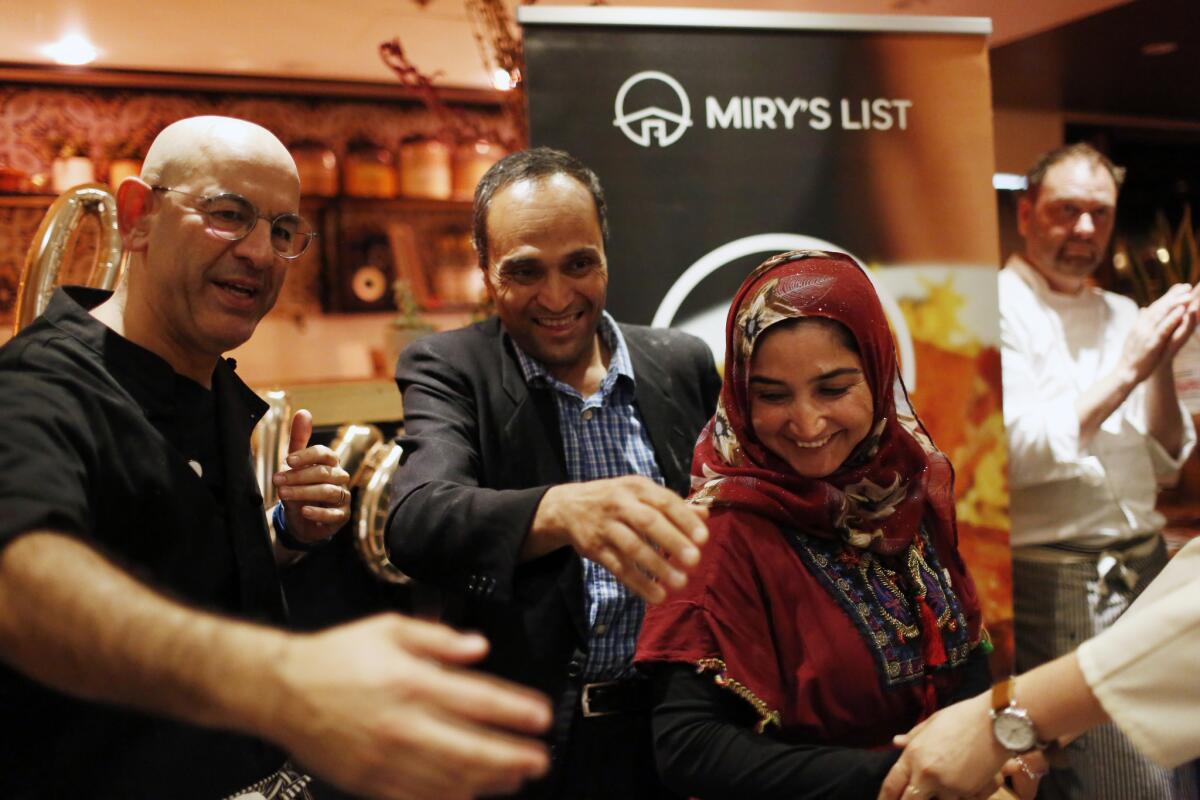
Kashefi, who also speaks halting English, leans on her husband, Bashir Kashefi, a former interpreter who aided the U.S. military, to do most of the talking.
His military career was marked by long stretches away from his family, punctuated by interludes of terror. During one mission locating IEDs in Helmand, his convoy was pinned down by gunfire. He would have died, he said, if not for helicopter reinforcements.
“It’s a dangerous job,” the 36-year-old said, “but I chose it to save other people’s lives.”
He knew he needed to get his family out of Afghanistan in 2014, around the time several of his fellow interpreters had gone missing. No one knew whether they had been killed or abducted by the Taliban.
In 2016, he applied for a special immigrant visa, a program available to people who worked with the U.S. armed forces as translators or interpreters in Afghanistan. The State Department issued more than 4,000 such visas to Afghan applicants in fiscal year 2017, but the program saw a 60% decrease in fiscal year 2018, according to Congress.
Interpreters also found themselves caught under the first iteration of the Trump administration’s travel ban in 2017. Some were detained upon arrival or had their visas revoked. Multiple recipients were denied boarding for their flights to the United States, the International Refugee Assistance Project said.
Despite those complications, Bashir Kashefi landed in Los Angeles with his pregnant wife and their daughter in March 2017. Their first weeks in America weren’t what they’d imagined. This time two years ago, the Kashefi family had never felt more alone.
“Before, we didn't know anyone. We had no friends here,” Bashir Kashefi told the dozens of people gathered around him at Spread.
His audience leaned in from their metal chairs, listening and slathering samosas with the fiery chutney his wife had concocted.
“Now,” Bashir Kashefi said, “everyone here is our friend.”
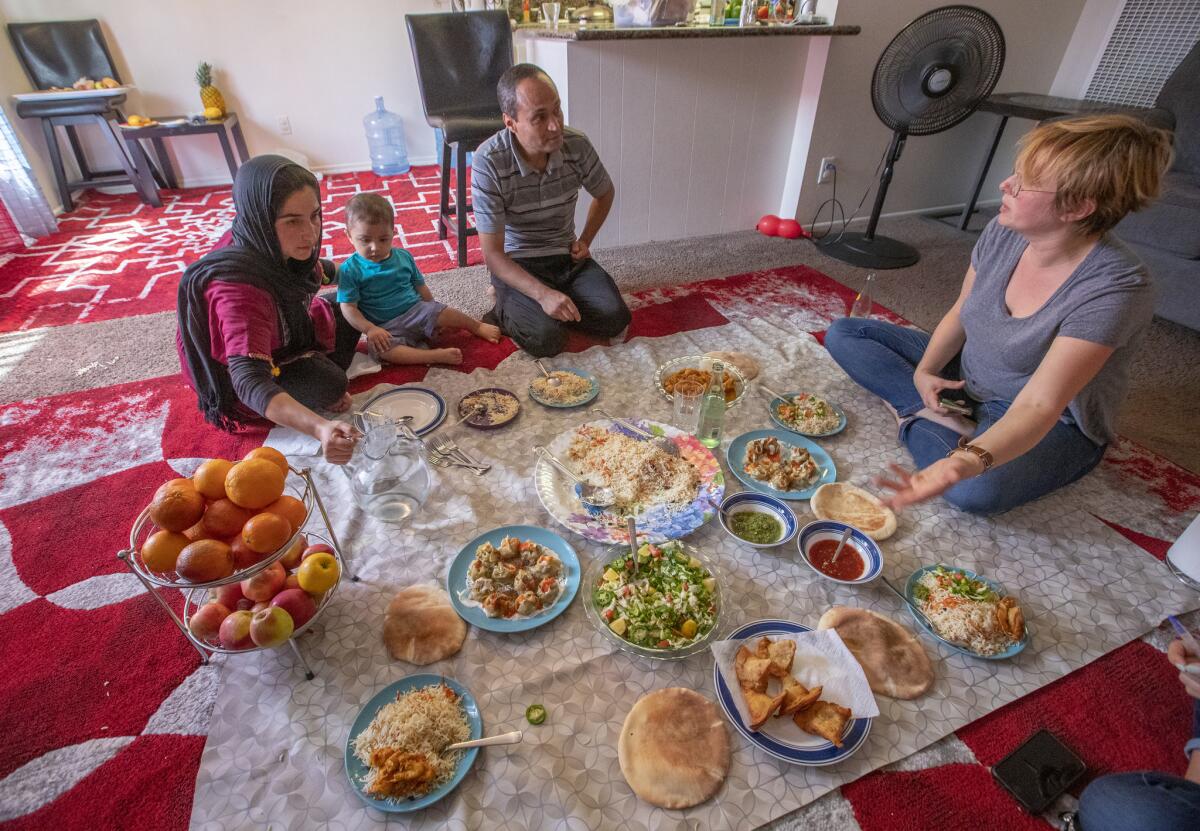
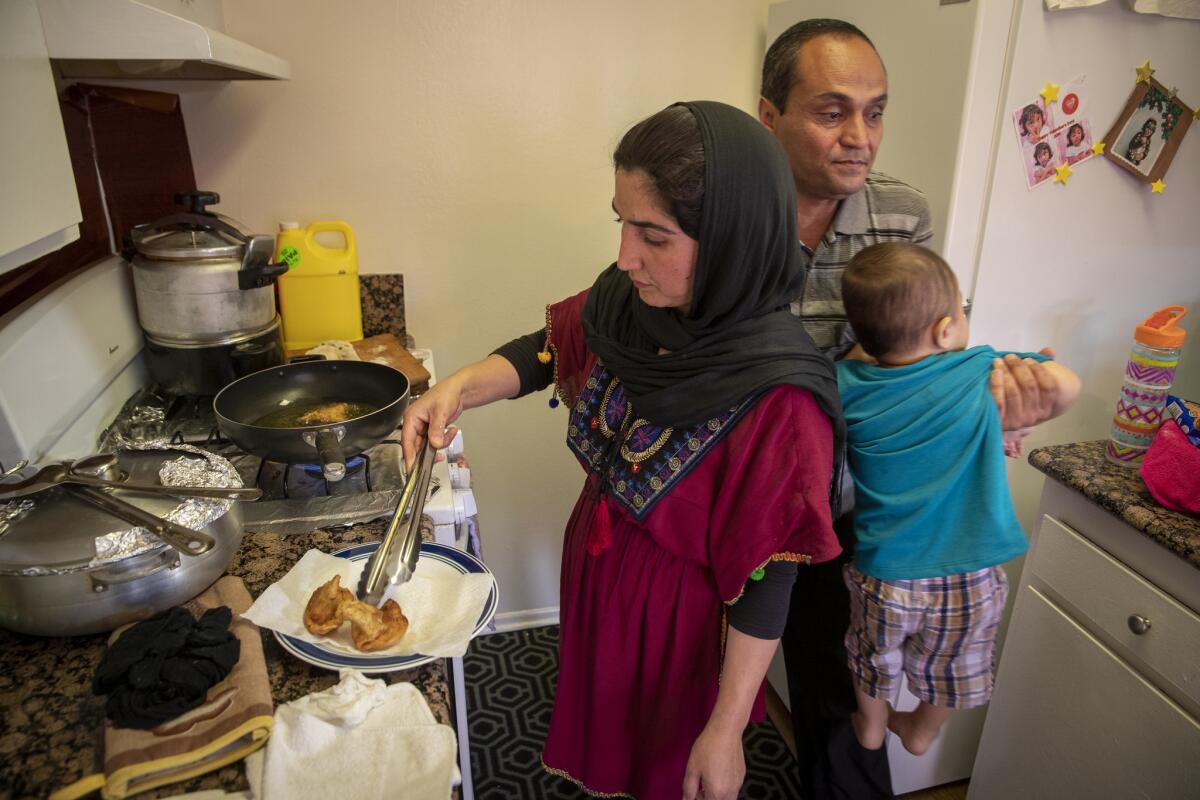
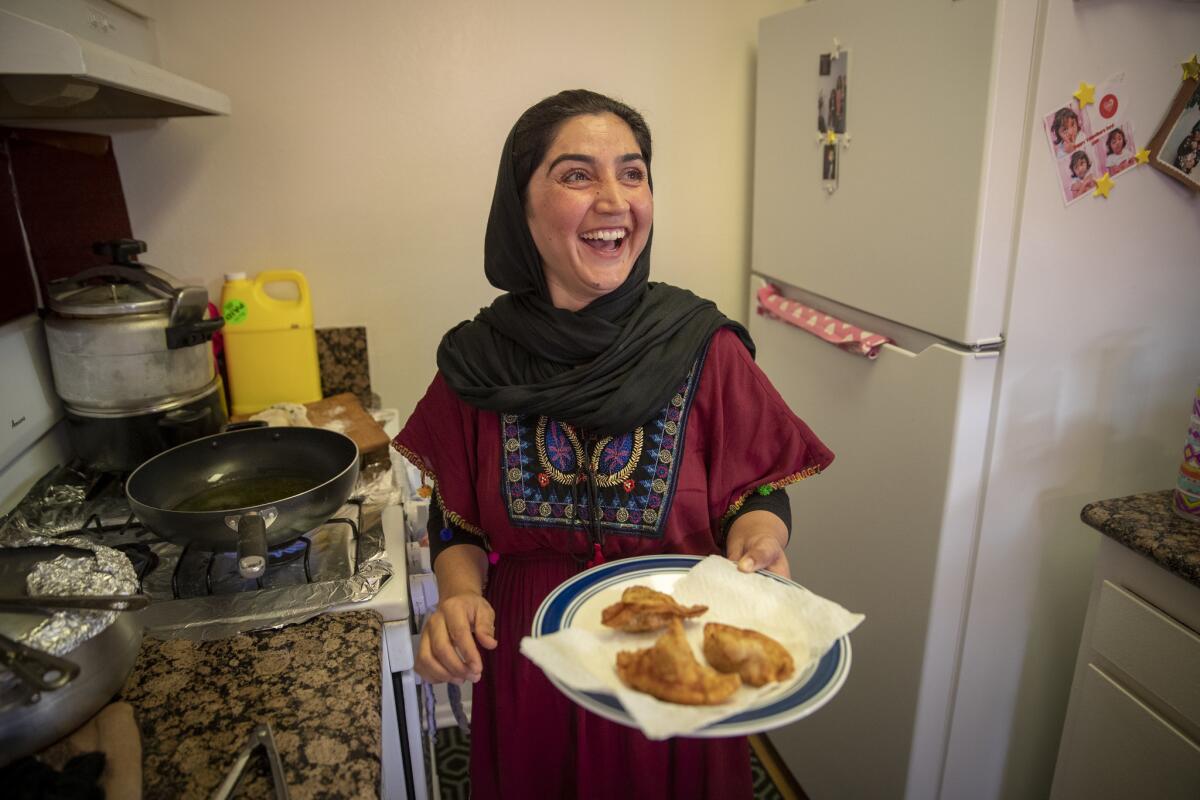
Inside her Anaheim apartment on a weekday afternoon, Kashefi’s hands pressed through soft dough, her fingers dusted in smatterings of flour. She kneaded the pale discs, stretched them like mini-pizzas and sliced them in half on her kitchen counter.
Reaching for the blend of curried potatoes, green onion and coriander resting in a metal bowl, the 26-year-old explained that her Afghan samosas are a staple at special occasions. She often makes them as a treat for guests. Her mother taught her how to make them when she was 16.
“My mom is a great house cook,” she said, swaddling a clump of dough and mixture like a newborn before sealing it.
Surrounded by the ingredients of her mother’s recipe, Kashefi couldn’t help but think of her life in Afghanistan and her parents, four brothers and two sisters — all left behind.
“Degh kardam,” she said, wiping away tears — I died of grief.
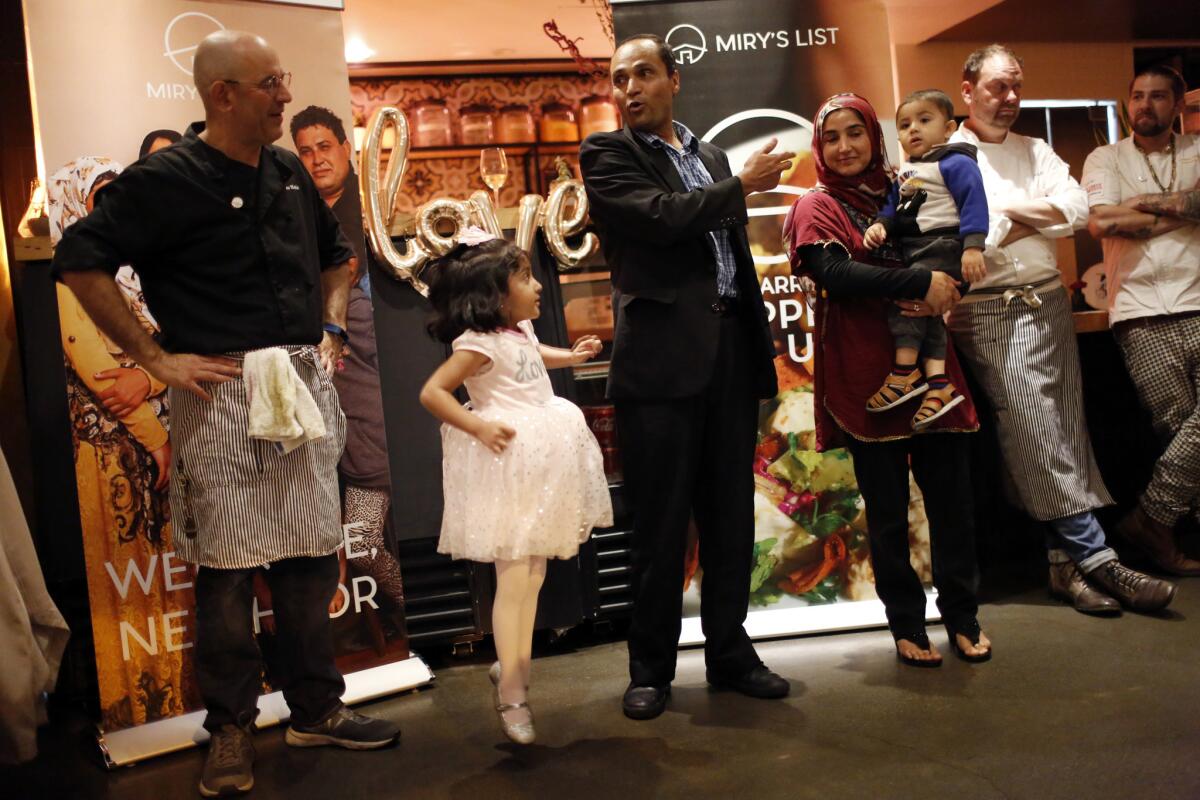
She has two children of her own now, a 4-year-old daughter and 2-year-old son who was born here, she said, and it’s better for them to grow up in California.
But cooking transports her to her mother’s side, Kashefi said, and she plans on passing her mother’s recipes down to her daughter, Horia.
For many diners, the draw of the supper club goes beyond what a cook puts on a plate. For some, themselves immigrants or first-generation Americans, the Kashefis’ story rang familiar.
Ken Chiu and his girlfriend, Elizabeth Pan, arrived with two friends to hear about what it means to be a refugee and how to help a new family. The pair, who live in Los Angeles, learned of the dinner through Miry’s List email blasts.
A dinner “makes giving so easy. You immediately know it goes directly to them,” Pan, 44, said as she tucked into a bowl of spicy red lentil dal.
“People who voluntarily immigrate can plan,” Chiu, 44, interjected. “But people like them relocate by circumstance.”
Whitehill buzzed through the crowd, dressed in an Afghan tunic, greeting diners and dancing with the Kashefis’ children.
“People come to our events with almost a paralyzing concept of what a refugee or immigration is,” she said. “Meeting and learning about a family, it transforms that paralysis to, ‘I can actually do something about this.’ For us, it’s the way we open the door.”
Whitehill started Miry’s List in 2016, after she helped a refugee family from Syria sponsored by a friend’s church.
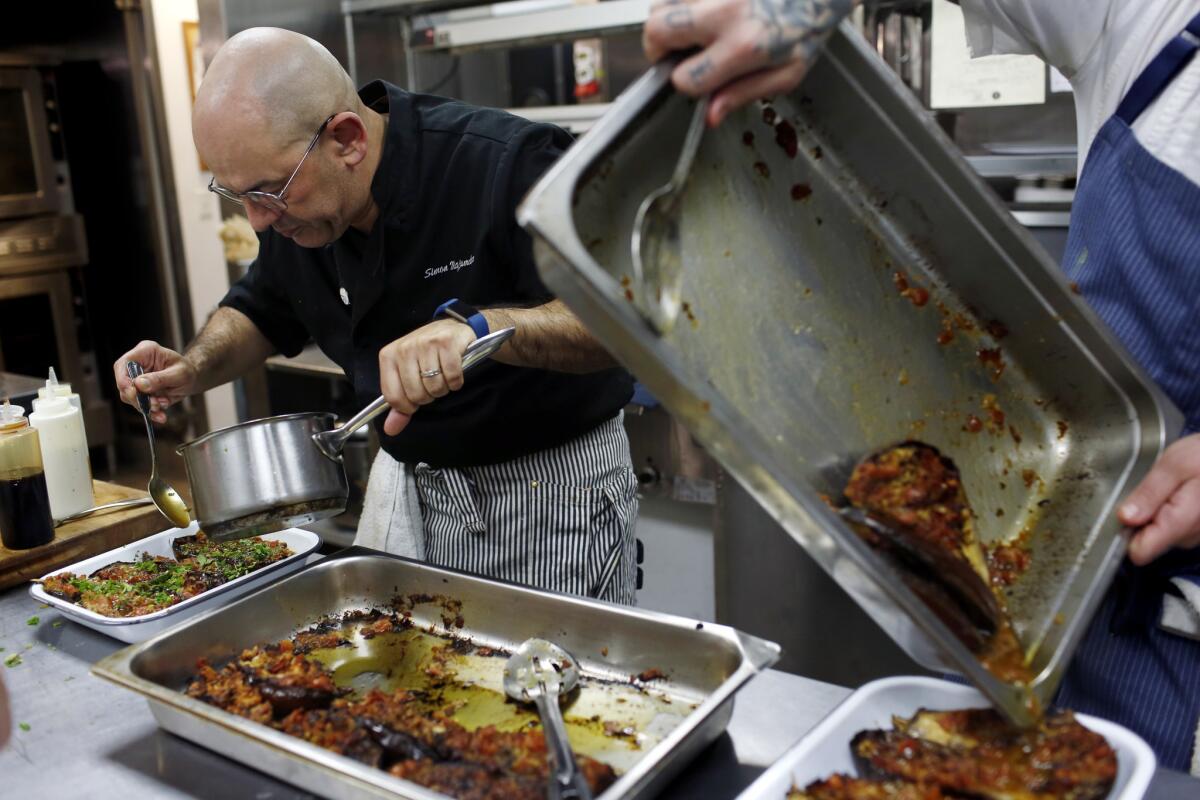
“Visiting them in their home, seeing what their apartment looked like, I recognized that they had needs for supplies, for things to start their first home,” she said. The first Miry’s List — a wish list filled with basics such as formula, diapers, eggs and milk — was born.
The organization has evolved since then, adding new-arrival dinners and events such as a multicultural Passover Seder. To Whitehill, Miry’s List is an extension of the values she was raised with in a close-knit Orthodox Jewish community that prized community service.
“In Hebrew, we call the concept chesed,” she said. “Kindness.”
The organization has helped more than 1,400 refugees from Syria, Afghanistan, Iraq, Iran, Yemen and Kurdistan at a time when the Trump administration’s travel restrictions have brought refugee admissions to historic lows.
California has taken in 126 refugees from Afghanistan since October 2018, in addition to the 1,612 Afghans who arrived in the state on special immigrant visas, according to data from the Refugee Processing Center. But advocates say new vetting rules put in place make it nearly impossible for people from certain countries to move to the U.S.
Whitehill aids refugees by providing transportation, helping to find lodging and checking in to see whether they need essentials for their home.
The agencies “take care of the basics that keep them alive, but not the things that make them feel alive,” she said. “That’s what we focus on.”
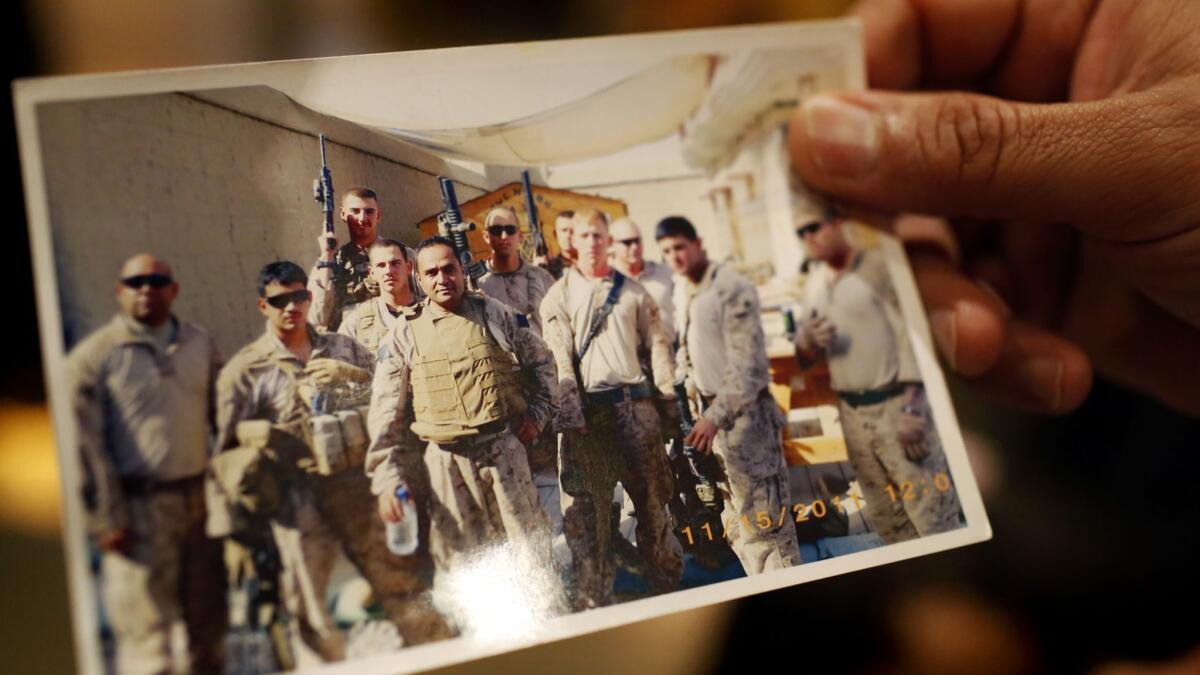
When the Kashefis arrived in Orange County, a caseworker set them up in a cramped one-bedroom apartment with another family. They lasted a week.
“We got sick there,” Bashir Kashefi said. “It was very difficult. Thirteen people to a bathroom, you can imagine.”
So the family set out on its own, homeless for two nights, sleeping on park benches with blankets and suitcases in tow.
On the third day, about 8:30 a.m., Kashefi told her husband she wanted to go home. They found a store and asked whether they could use the phone to call the police. Perhaps, the Kashefis thought, they would help them get back to Kabul.
“Don’t call 911. They might cause more problems for you,” Bashir Kashefi recalled an employee saying.
A man walked by. He also was from Afghanistan and overheard the conversation. He told the Kashefis that he could connect them to someone who could help. A few minutes later, Bashir Kashefi was on the phone with a woman who worked with Miry’s List.
The woman contacted Whitehill, who urged the Kashefis to stay, sent a taxi and put them up in a hotel for two days, then paid for their stay in a motel for a month. The organization helped them find the apartment they live in now and helped Bashir Kashefi find a car so he could get to his job as a security guard in Fullerton.
“I am glad that we didn’t go back,” he said.
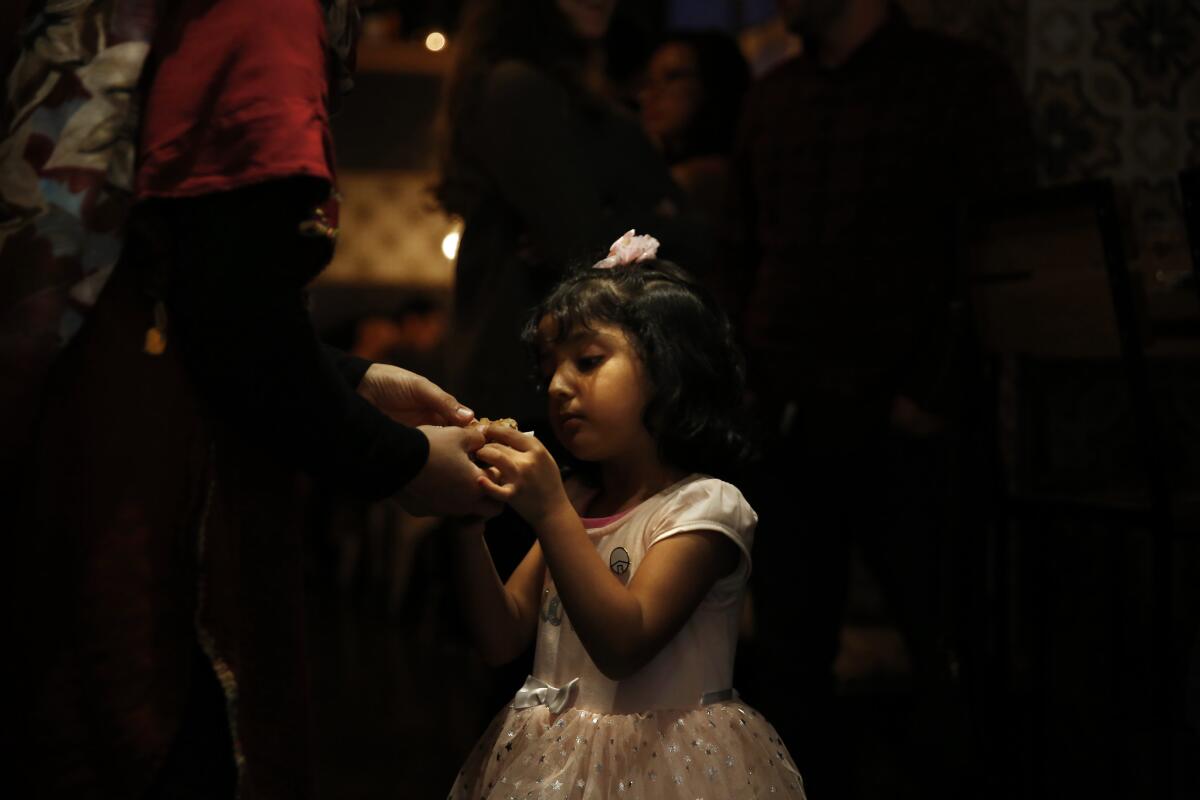
As the dinner party wound down, conversations shifted to the difficulties of the resettlement process. Bashir Kashefi and his wife were lucky because he speaks English, some diners observed. They wondered what happened to families who knew only their native tongue.
“That’s just so wrong,” Huynh, 38, said. Her parents are Vietnamese refugees, she added.
Huynh and Yap, who’d driven in from La Verne, turned to Kashefi, curious about how she was adjusting to her life in Anaheim. Did she like the city? Had she been to Disneyland? Does she still have family to call in Afghanistan?
Kashefi opened the purse resting at her side and pulled out her phone. She showed them photos of her family — the brother she hopes will join her in California, then a picture of her mother. She kissed the screen.
“I couldn’t live without talking to her,” she said.
Moments later, a hush fell over the room as Bashir Kashefi stood and addressed the crowd. Passing around photos of himself alongside U.S. troops, he explained how much he loved America.
The country has grown on his wife too, he said.
“I ask my wife now, ‘Do you want to go back?’ and she says, ‘No.’”
The crowd rose to their feet, welcoming the family with a standing ovation.
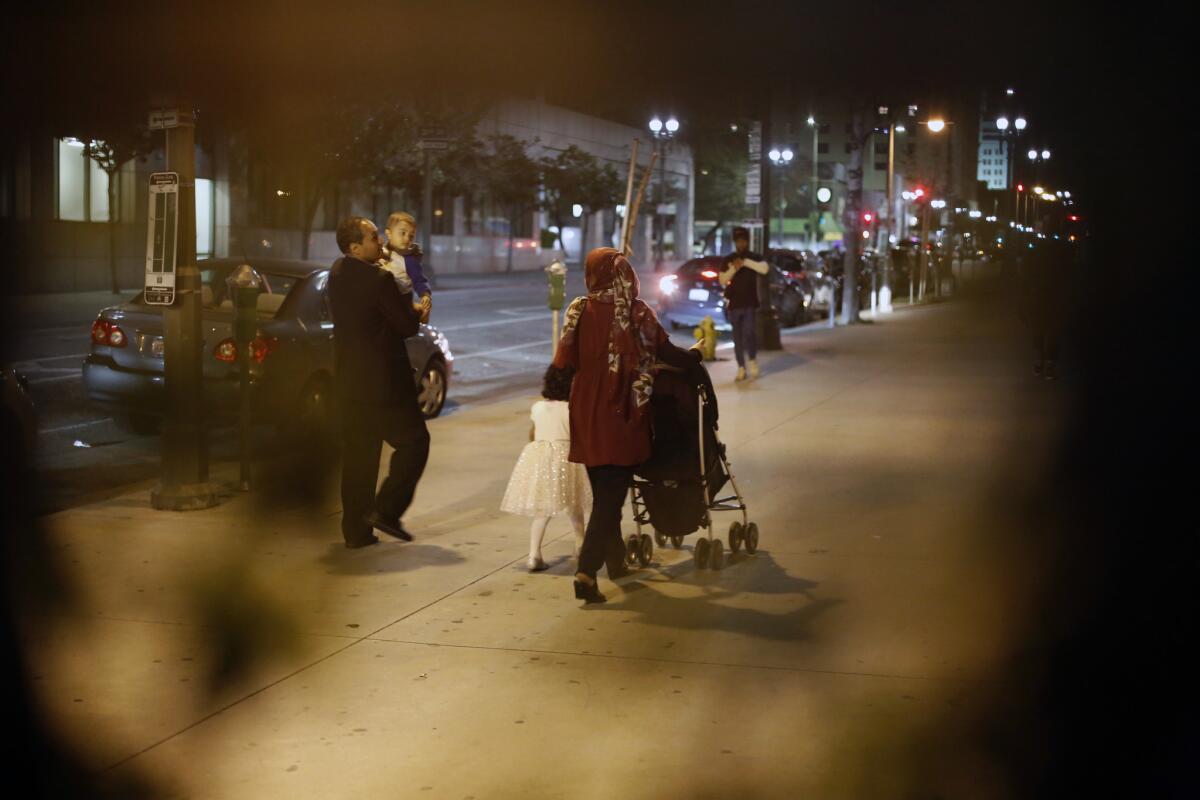
Sign up for Essential California
The most important California stories and recommendations in your inbox every morning.
You may occasionally receive promotional content from the Los Angeles Times.







